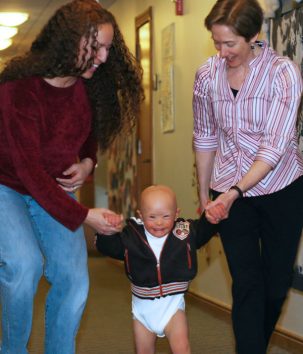Sie Center for Down Syndrome Psychologist and Behavioral Expert Shares Valuable Knowledge
The average age for a typical child to be toilet trained is 29 months for girls, and 31 months for boys. Interestingly, the average age has been on the rise from previous decades influenced by cultural, socioeconomic and market-driven factors (e.g. comfortable diapers and pull-ups). There is very limited research on toilet training in children with Down syndrome. However, one national study done in England found that some children with Down syndrome became trained at the same age, if not earlier than, many typical children.
Visit the Sie Center for Down Syndrome website to schedule an appointment with Dr. Lina Patel or the other experts at the Sie Center.
 Lina Patel, PsyD, Director of Psychology at the Anna & John J. Sie Center for Down Syndrome, is a renowned psychologist and behavioral expert specializing in treatment planning, diagnostic evaluation and intervention for children with Down syndrome. She has worked with hundreds of children with Down syndrome and their families. Dr. Patel also serves on the Global Task Force for Adults with Down Syndrome as a member of the Clinical Care Subcommittee.
Lina Patel, PsyD, Director of Psychology at the Anna & John J. Sie Center for Down Syndrome, is a renowned psychologist and behavioral expert specializing in treatment planning, diagnostic evaluation and intervention for children with Down syndrome. She has worked with hundreds of children with Down syndrome and their families. Dr. Patel also serves on the Global Task Force for Adults with Down Syndrome as a member of the Clinical Care Subcommittee.
Considering all the resources available, and what families have shared with me, there are many different opinions and approaches when it comes to toilet training. Some believe that their child will let them know when they are ready; others take a more intensive approach and choose several days to focus solely on toilet training. Given what I have seen work, I favor the middle ground for children with Down syndrome. Sometimes we have to decide for children when it is time to toilet train, and it doesn’t have to be an overly stressful experience for anyone. Below are my tips to increase the chances for success:
1. Caregivers have to be ready. Toilet training requires an incredible amount of patience, consistency, and most importantly, time. Pick a few weeks when you don’t have any trips, vacations, major medical interventions, etc.

Patricia Winders (right), Senior Physical Therapist at the Sie Center for Down Syndrome, works with a patient and his mother.
2. Children have to physically be ready. Toilet training requires balance, muscle strength, awareness, control, motivation, nerve and muscle maturity, and more. The limited research on toilet training in children with Down syndrome shows that being fully toilet trained can occur anywhere from 8 months to 12 years. No research has been done to define when physical ability for toilet training is achieved.
3. Create a plan. Collect data for 3 days to see if your child can “hold it” and for how long. Based on that data, you will determine how often to take your child to the bathroom. Too often could result in refusal behaviors, and not often enough may result in children not making the connections to go in the toilet instead of a diaper.
4. Less stress is best. If going to the bathroom becomes a dreadful experience, challenging behaviors will not only prevent success, but may also spill over into other situations. Additionally, children with Down syndrome have such great visual memory that a negative experience will be much harder to overcome.
5. Keep it positive. Praise your child for sitting on the toilet, even if they don’t produce anything. Positive interactions and praise equal motivation to keep trying.
6. Make things more concrete. Use a visual timer to show how long a child has to sit on the toilet (no more than 2 minutes) before they can move on. Tell your child “first pee pee in the potty, then (a preferred activity)”.
7. Be patient. Toilet training can be a challenge for children with Down syndrome for many reasons including difficulty sitting on the toilet due to low muscle tone and balance, anxiety about constipation, struggling with breaking the routine of using a diaper, and not being motivated to stay dry or clean. Patience and understanding, along with a game plan to overcome these challenges, will lead to long-term success.
Ultimately, each child is unique and poses different challenges in the process. Consult with a psychologist or behavioral specialist to tease out what may be interfering with your child’s ability to toilet train.
Visit the Sie Center for Down Syndrome website to schedule an appointment with Dr. Lina Patel or the other experts at the Sie Center.
Follow the links below to view Dr. Lina Patel’s Global Educational Series Presentation on Understanding Behaviors: Finding the Root of the Problem

 Experience our inspirational and groundbreaking videos and photos. Our children and self-advocates are beautiful AND brilliant!
Experience our inspirational and groundbreaking videos and photos. Our children and self-advocates are beautiful AND brilliant! Make sure your local Representatives are on the Congressional Down Syndrome Task Force.
Make sure your local Representatives are on the Congressional Down Syndrome Task Force.